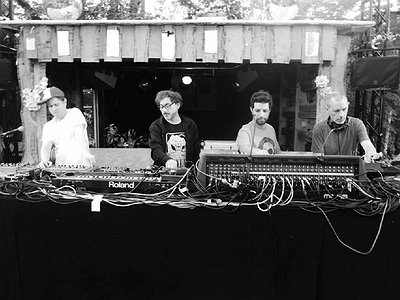Part 2
Could you take us through a day in your life, from a possible morning routine through to your work? Do you have a fixed schedule? How do music and other aspects of your life feed back into each other - do you separate them or instead try to make them blend seamlessly?
Jonah: I have no fixed schedule regarding music production, but usually it's very early morning or a very late session when the family's asleep! My activities involve sound design, production for others and teaching music tech so everything ultimately helps each other. Seem to be spending a bit of time these days researching the bewildering amount of cool new music toys out there - now is the best time for electronic production possibilities, there are things available now we could never have dreamt of 20 years ago!
Could you describe your creative process on the basis of a piece or album that's particularly dear to you, please? Where did the ideas come from, how were they transformed in your mind, what did you start with and how do you refine these beginnings into the finished work of art?
David: Inspiration comes from different sources. In my case the creative process was often triggered by a certain sound or a piece of gear that I was getting familiar with. Sometimes, it is something you hear by others that inspires you, but most commonly I start off playing a guitar or a keyboard and come across chord progressions or motives by just playing and listening.
There are many descriptions of the ideal state of mind for being creative. What is it like for you? What supports this ideal state of mind and what are distractions? Are there strategies to enter into this state more easily?
Jonah: Usually I like to put in at least 6 hours most days doing something useful musically. This would obviously involve a clear day with no distractions - i.e.a gig, taking dog to vet etc. But I like that I can now sit on a plane or train or hotel and play around with say a Korg Volca FM or even an iPad and come up with ideas
How is playing live and writing music in the studio connected? What do you achieve and draw from each experience personally? How do you see the relationship between improvisation and composition in this regard?
Jordan: In the case of the Mulholland Free Clinic, all the things you mentioned are the same. We only play live, all improvised, all mixed live and composed live. I guess what I'm saying is that in our case composition is identical to improvisation. The challenge is to compose something of value while improvising. That is rare. And is basically what we are attempting every performance.
How do you see the relationship between the 'sound' aspects of music and the 'composition' aspects? How do you work with sound and timbre to meet certain production ideas and in which way can certain sounds already take on compositional qualities?
Jonah: A music production session might be only doing a load of sound design for my library or experimenting with interfacing different gear in new ways. It's quite easy to get lost in that side of things so a compositional session would be a different approach, usually putting into practice some new interface technique set up the day before or using some new sounds previously created.
Our sense of hearing shares intriguing connections to other senses. From your experience, what are some of the most inspiring overlaps between different senses - and what do they tell us about the way our senses work? What happens to sound at its outermost borders?
David: I was seeing notes and numbers as colours as a kid. Today this phenomenon has vanished but still a certain smell can trigger the strongest memories and associations.
Sound is an integral part of nature as we see and perceive music is closely connected to mathematics and physics and you can draw or discover parallels. But I’m not a scientist. I can’t tell you what happens to sound at it’s outermost borders, but I know that music functions as global way of communication and understanding, regardless of cultural background, religion, sex, age and race and it is even received and appreciated by certain animals. Plants are reacting to music by better growth.
All this is making me optimistic that music will be the most appropriate way of communicating universally with different species, if we should ever find them or if “they” find us.
Art can be a purpose in its own right, but it can also directly feed back into everyday life, take on a social and political role and lead to more engagement. Can you describe your approach to art and being an artist?
David: Art has no immanent purpose and no rules. We define these attributes and fill pieces of art with meaning and interpretations. Of course, there are artists who are explicitly political and are using their popularity to create art as a vehicle for their convictions. I personally agree with that and I think every human with a brain should be free to use whatever means they have to exchange their thoughts with others or comment on social or whatever wrongs.
It is remarkable, in a way, that we have arrived in the 21st century with the basic concept of music still intact. Do you have a vision of music, an idea of what music could be beyond its current form?
Jordan: Seems like music is a very primal human form of communication. So maybe once the form of human evolves, so will the form of music.





